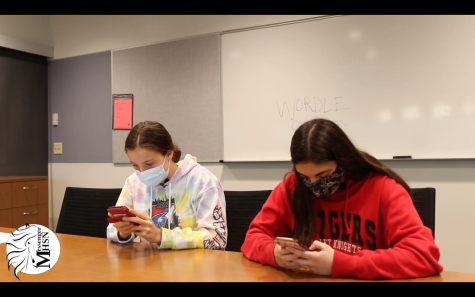AP Government Classes Not Focusing on Comparative Government due to COVID-19
Media by Marin Ellington
Due to COVID-19 modifying the schedule for the school year, changes have been made to the content being taught in AP government classes. “I had to take a step back and be like, ‘But really, we’re all dealing with a lot right now,'” Erin Sullenger, social studies teacher, said.
Lauren King, junior, had been excited to take an AP government class since freshman year when her teacher mentioned she would thrive in an advanced social studies class.
The course functions as essentially two different classes, teaching U.S. government first semester and comparative government second semester, offering two different AP exams at the end of the year.
However, due to COVID-19, a decision was made by the district that comparative government would not be taught during the 2020-2021 school year and only the AP government exam would be offered.
“I honestly felt a little sad that I wasn’t able to do the comparative government course this year,” King said. “I was excited to do it and learn about different governments all over the world.”
However, comparative government will be offered as a spring semester course next school year only for those students currently enrolled in the class. Students who elect to take this class will be placed in an already existing AP government class at the start of second semester and will have the option to take the AP exam.
MHS surveyed current AP government students, and though few responded who were interested, King was one of the students who plans to enroll in the class.
Everyone has a lot more of everything on their plates from managing this weird schedule and day-to-day life all the way to dealing with the stress that comes from it.
— Christian Barger, junior
“I figured I would be missing out on what the entire class of AP government had to offer,” King said.
To enroll in the spring semester comparative government class, students must schedule a meeting with their counselor who will enter a specialized code that registers students for the class.
Erin Sullenger, social studies teacher, is one of five teachers in the district who teaches the AP government class and was actively involved in making the decision not to teach comparative government this school year.
Sullenger said they did not want to teach the class in the case that school would still be on the quarter system during second semester and they doubted their ability to teach such a large amount of information in only the five weeks before AP exams.
“We really wanted to protect our students and ourselves and just think about how life was at that point in time,” Sullenger said.
U.S. government is being taught as a whole year class at a slower pace with more work time built-in that would not have happened during a traditional school year.
Though many schools do teach AP government as a year-long course, Sullenger said this is too much time because many students come to the class with somewhat of a background knowledge on the subject.
Sullenger said she expects next year to be similar to what a normal year would look like with both classes being taught during consecutive semesters.
“Sometimes I feel rushed in a semester, but I definitely feel like it’s too much time to go over an entire year,” Sullenger said. “I’m hoping to not ever be on the quarter system again if I’m being honest.”
Christian Barger, junior, is currently enrolled in the AP government and is understanding of the decision made to abstain from teaching comparative government this year, though he does not plan on taking it next year.
“Everyone has a lot more of everything on their plates from managing this weird schedule and day-to-day life all the way to dealing with the stress that comes from it,” Barger said.
Though he finds the class easier this year than it has potentially been in previous years as a result of the slower pace of the course, Barger still sees the class as more advanced than a regular government class.
“Ultimately the upcoming AP test will be the true judge of how learning went,” Barger said.
Luker Roder, senior, took the AP government class last school year, and though he did not take the comparative government exam, he still had a chance to learn the material.
Roder said both classes were paced relatively well, though comparative government moved much more quickly with a shorter amount of time to get through the information before AP exams. He found the U.S. government portion of the class to be more practical.
“I much preferred learning about the U.S. government, so taking a slower and even more in-depth look at it sounds more enjoyable,” Roder said.
Your donation will support the student journalists of Marquette High School. Your contribution will allow us to purchase equipment and cover our annual website hosting costs. You may become a PATRON by making a donation at one of these levels: White/$30, Green/$50, Blue/$100. Patron names will be published in the print newsmagazine, on the website and once per quarter on our social media accounts.

Marin Ellington (she/her), senior, is the Editor in Chief of the Marquette Messenger. In addition to her involvement in student journalism at Marquette,...












